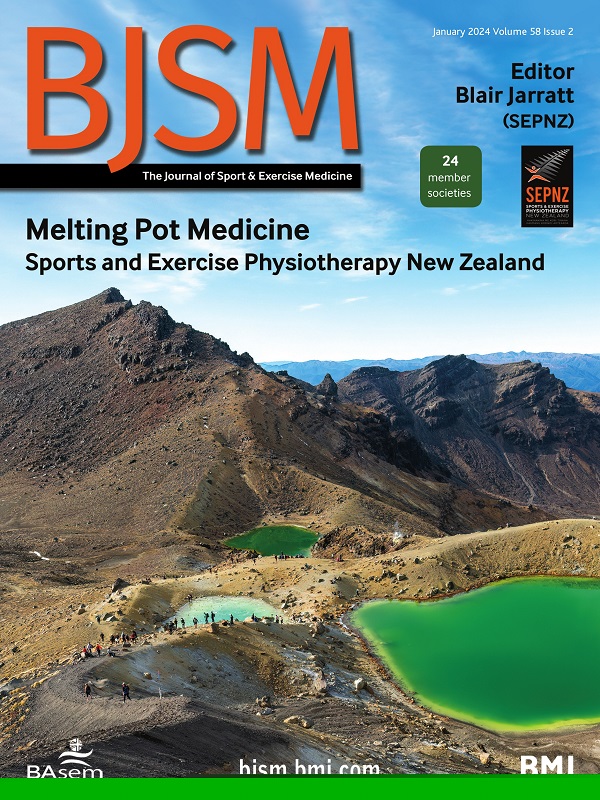Firing up the rehabilitation: a holistic approach emphasising complex practice environments to change exercise behaviour
IF 11.6
1区 医学
Q1 SPORT SCIENCES
引用次数: 0
Abstract
Rehabilitation, covering areas such as injury, cardiac, pulmonary and mental health, is evolving toward patient-centred care.1 However, motivating patients to maintain exercise habits remains challenging,2 with a disconnect between programme design, behavioural change theories and professionals’ ability to apply behavioural change techniques.3 The aim of this editorial is to emphasise the need for rehabilitation programmes that move beyond traditional treatments by integrating holistic, patient-centred approaches. This includes fostering emotional, psychological and social growth alongside physical recovery. Social-structural and interpersonal barriers hinder adherence to exercise maintenance. A lack of psychological and social support significantly impacts adherence to exercise interventions, both during and after rehabilitation, which is essential for initiating and sustaining health-related behaviours.2 4 5 Habitual behaviours, deeply ingrained and automatic, inhibit new interventions, highlighting the need for targeted, context-specific strategies.4 Enhancing the expertise of rehabilitation professionals to use theoretical models promoting holistic approaches can help break down entrenched beliefs and foster new cultural understandings about rehabilitation.6 Compliance has been an issue in physiotherapy since the 1970s.7 The role of rehabilitation in patients’ lives should not be reduced to just ‘medicine’. Such programmes ought to integrate into a patient’s life, seeking not just health (mostly physical)8 results but also personal growth, emotional enhancement and positive social connections. The motivation for individuals to adhere to a rehabilitation programme, ensuring exercise maintenance, should not be dictated only by fear of health deterioration, physical performance or other external factors. These external motivations …启动康复:强调复杂实践环境的整体方法,以改变锻炼行为
康复,包括伤害、心脏、肺和精神健康等领域,正在向以病人为中心的护理发展然而,激励患者保持锻炼习惯仍然具有挑战性,因为在项目设计、行为改变理论和专业人员应用行为改变技术的能力之间存在脱节这篇社论的目的是强调康复规划的必要性,通过整合以病人为中心的整体方法,超越传统治疗。这包括在身体恢复的同时促进情感、心理和社会的成长。社会结构和人际障碍阻碍了坚持锻炼。在康复期间和康复后,缺乏心理和社会支持会严重影响对运动干预措施的坚持,而这对于发起和维持与健康相关的行为至关重要。根深蒂固的、自动的习惯性行为抑制了新的干预,强调了有针对性的、针对具体情况的策略的必要性提高康复专业人员的专业知识,运用理论模型促进整体方法,有助于打破根深蒂固的观念,培养对康复的新文化理解自20世纪70年代以来,依从性一直是物理治疗中的一个问题康复在病人生活中的作用不应该被简化为仅仅是“治疗”。这些项目应该融入病人的生活,不仅寻求健康(主要是身体上的)结果,还寻求个人成长、情感提升和积极的社会联系。个人坚持康复方案并确保保持锻炼的动机不应仅仅由担心健康恶化、身体表现或其他外部因素决定。这些外部动机……
本文章由计算机程序翻译,如有差异,请以英文原文为准。
求助全文
约1分钟内获得全文
求助全文
来源期刊
CiteScore
27.10
自引率
4.90%
发文量
217
审稿时长
3-8 weeks
期刊介绍:
The British Journal of Sports Medicine (BJSM) is a dynamic platform that presents groundbreaking research, thought-provoking reviews, and meaningful discussions on sport and exercise medicine. Our focus encompasses various clinically-relevant aspects such as physiotherapy, physical therapy, and rehabilitation. With an aim to foster innovation, education, and knowledge translation, we strive to bridge the gap between research and practical implementation in the field. Our multi-media approach, including web, print, video, and audio resources, along with our active presence on social media, connects a global community of healthcare professionals dedicated to treating active individuals.

 求助内容:
求助内容: 应助结果提醒方式:
应助结果提醒方式:


